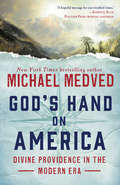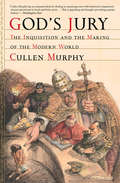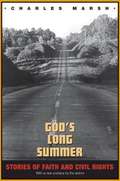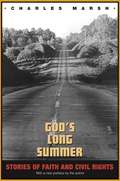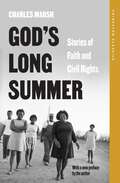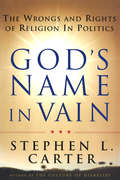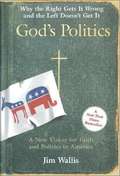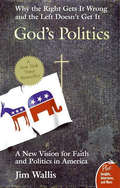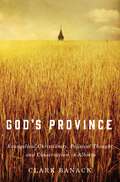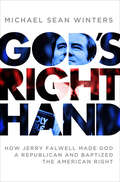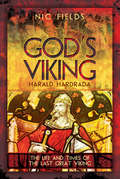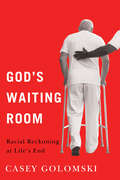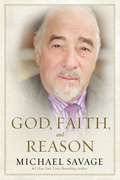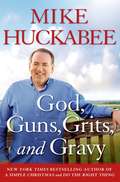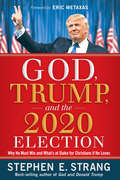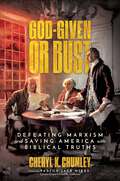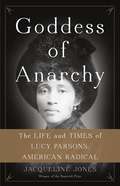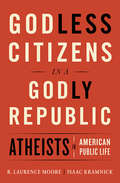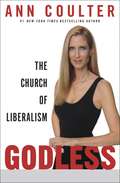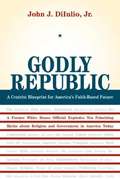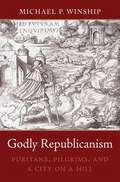- Table View
- List View
God's Hand on America: Divine Providence in the Modern Era
by Michael MedvedThe national radio host and bestselling author of The American Miracle reveals the happy accidents, bizarre coincidences, and flat-out miracles that continue to shape America&’s destiny. &“A hopeful message for our troubled times . . . Michael Medved has an eye for a story, and a preternatural gift for telling it in beguiling ways.&”—Joseph J. Ellis, Pulitzer Prize and National Book Award–winning author of Founding Brothers Has God withdrawn his special blessing from the United States? Americans ponder that painful question in troubled times, as we did during the devastation of the Civil War and after the assassinations of the &’60s, and as we do in our present polarization. Yet somehow—on battlefields, across western wilderness, and in raucous convention halls—astounding events have reliably advanced America, restoring faith in the Republic&’s providential protection. In this provocative historical narrative, Michael Medved brings to life ten haunting tales that reveal this purposeful pattern, including: • A near-fatal carriage accident forces Lincoln&’s secretary of state into a canvas-and-steel neck brace that protects him from a would-be assassin&’s knife thrusts, allowing him two years later to acquire Alaska for the United States. • A sudden tidal wave of Russian Jewish immigration, beginning in 1881, coincides with America&’s rise to world leadership, fulfilling a biblical promise that those blessing Abraham&’s children will themselves be blessed. • Campaigning for president, Theodore Roosevelt takes a bullet in the chest, but a folded speech in his jacket pocket slows its progress and saves his life. • At the Battle of Midway, U.S. planes get lost over empty ocean and then miraculously reconnect for five minutes of dive-bombing that wrecks Japan&’s fleet, convincing even enemy commanders that higher powers intervened against them. • A behind-the-scenes &“conspiracy of the pure of heart&” by Democratic leaders forces a gravely ill FDR to replace his sitting vice president—an unstable Stalinist—with future White House great Harry Truman. These and other little-known stories build on themes of The American Miracle, Medved&’s bestseller about America&’s remarkable rise. The confident heroes and stubborn misfits in these pages shared a common faith in a master plan, which continues to unfold in our time. God&’s Hand on America confirms that the founders were right about America&’s destiny to lead and enlighten the world.
God's Jury: The Inquisition and the Making of the Modern World
by Cullen Murphy&“From Torquemada to Guantánamo and beyond, Cullen Murphy finds the &‘inquisitorial impulse&’ alive, and only too well, in our world&” (Jane Mayer, author of Dark Money). Established by the Catholic Church in 1231, the Inquisition continued in one form or another for almost seven hundred years. Though associated with the persecution of heretics and Jews—and with burning at the stake—its targets were more numerous, its techniques were more ambitious, and its effect on history has been greater than many understand. The Inquisition pioneered surveillance, censorship, and &“scientific&” interrogation. As time went on, its methods and mindset spread far beyond the Church to become tools of secular persecution. Traveling from freshly opened Vatican archives to the detention camps of Guantánamo to the filing cabinets of the Third Reich, the author of Are We Rome? &“masterfully traces the social, legal and political evolution of the Inquisition and the inquisitorial process from its origins in late medieval Christian France to its eerily familiar, secular cousin in the modern world&” (San Francisco Chronicle). &“God&’s Jury is a reminder, and we need to be constantly reminded, that the most dangerous people in the world are the righteous, and when they wield real power, look out. . . . Murphy wears his erudition lightly, writes with quiet wit, and has a delightful way of seeing the past in the present.&” —Mark Bowden, author of Hue 1968 &“Beautifully written, very smart, and devilishly engaging.&” —The Boston Globe
God's Long Summer: Stories of Faith and Civil Rights
by Charles MarshIn the summer of 1964, the turmoil of the civil rights movement reached its peak in Mississippi, with activists across the political spectrum claiming that God was on their side in the struggle over racial justice. This was the summer when violence against blacks increased at an alarming rate and when the murder of three civil rights workers in Mississippi resulted in national media attention. Charles Marsh takes us back to this place and time, when the lives of activists on all sides of the civil rights issue converged and their images of God clashed. He weaves their voices into a gripping narrative: a Ku Klux Klansman, for example, borrows fiery language from the Bible to link attacks on blacks to his "priestly calling"; a middle-aged woman describes how the Gospel inspired her to rally other African Americans to fight peacefully for their dignity; a SNCC worker tells of harrowing encounters with angry white mobs and his pilgrimage toward a new racial spirituality called Black Power. Through these emotionally charged stories, Marsh invites us to consider the civil rights movement anew, in terms of religion as a powerful yet protean force driving social action. The book's central figures are Fannie Lou Hamer, who "worked for Jesus" in civil rights activism; Sam Bowers, the Imperial Wizard of the White Knights of the Ku Klux Klan of Mississippi; William Douglas Hudgins, an influential white Baptist pastor and unofficial theologian of the "closed society"; Ed King, a white Methodist minister and Mississippi native who campaigned to integrate Protestant congregations; and Cleveland Sellers, a SNCC staff member turned black militant. Marsh focuses on the events and religious convictions that led each person into the political upheaval of 1964. He presents an unforgettable American social landscape, one that is by turns shameful and inspiring. In conclusion, Marsh suggests that it may be possible to sift among these narratives and lay the groundwork for a new thinking about racial reconciliation and the beloved community. He maintains that the person who embraces faith's life-affirming energies will leave behind a most powerful legacy of social activism and compassion.
God's Long Summer: Stories of Faith and Civil Rights
by Charles MarshIn the summer of 1964, the turmoil of the civil rights movement reached its peak in Mississippi, with activists across the political spectrum claiming that God was on their side in the struggle over racial justice. This was the summer when violence against blacks increased at an alarming rate and when the murder of three civil rights workers in Mississippi resulted in national media attention. Charles Marsh takes us back to this place and time, when the lives of activists on all sides of the civil rights issue converged and their images of God clashed. He weaves their voices into a gripping narrative: a Ku Klux Klansman, for example, borrows fiery language from the Bible to link attacks on blacks to his "priestly calling"; a middle-aged woman describes how the Gospel inspired her to rally other African Americans to fight peacefully for their dignity; a SNCC worker tells of harrowing encounters with angry white mobs and his pilgrimage toward a new racial spirituality called Black Power. Through these emotionally charged stories, Marsh invites us to consider the civil rights movement anew, in terms of religion as a powerful yet protean force driving social action. The book's central figures are Fannie Lou Hamer, who "worked for Jesus" in civil rights activism; Sam Bowers, the Imperial Wizard of the White Knights of the Ku Klux Klan of Mississippi; William Douglas Hudgins, an influential white Baptist pastor and unofficial theologian of the "closed society"; Ed King, a white Methodist minister and Mississippi native who campaigned to integrate Protestant congregations; and Cleveland Sellers, a SNCC staff member turned black militant. Marsh focuses on the events and religious convictions that led each person into the political upheaval of 1964. He presents an unforgettable American social landscape, one that is by turns shameful and inspiring. In conclusion, Marsh suggests that it may be possible to sift among these narratives and lay the groundwork for a new thinking about racial reconciliation and the beloved community. He maintains that the person who embraces faith's life-affirming energies will leave behind a most powerful legacy of social activism and compassion.
God's Long Summer: Stories of Faith and Civil Rights (Princeton Classics #142)
by Charles MarshIn the summer of 1964, the turmoil of the civil rights movement reached its peak in Mississippi, with activists across the political spectrum claiming that God was on their side in the struggle over racial justice. This was the summer when violence against blacks increased at an alarming rate and when the murder of three civil rights workers in Mississippi resulted in national media attention. Charles Marsh takes us back to this place and time, when the lives of activists on all sides of the civil rights issue converged and their images of God clashed. He weaves their voices into a gripping narrative: a Ku Klux Klansman, for example, borrows fiery language from the Bible to link attacks on blacks to his "priestly calling"; a middle-aged woman describes how the Gospel inspired her to rally other African Americans to fight peacefully for their dignity; a SNCC worker tells of harrowing encounters with angry white mobs and his pilgrimage toward a new racial spirituality called Black Power. Through these emotionally charged stories, Marsh invites us to consider the civil rights movement anew, in terms of religion as a powerful yet protean force driving social action.The book's central figures are Fannie Lou Hamer, who "worked for Jesus" in civil rights activism; Sam Bowers, the Imperial Wizard of the White Knights of the Ku Klux Klan of Mississippi; William Douglas Hudgins, an influential white Baptist pastor and unofficial theologian of the "closed society"; Ed King, a white Methodist minister and Mississippi native who campaigned to integrate Protestant congregations; and Cleveland Sellers, a SNCC staff member turned black militant.Marsh focuses on the events and religious convictions that led each person into the political upheaval of 1964. He presents an unforgettable American social landscape, one that is by turns shameful and inspiring. In conclusion, Marsh suggests that it may be possible to sift among these narratives and lay the groundwork for a new thinking about racial reconciliation and the beloved community. He maintains that the person who embraces faith's life-affirming energies will leave behind a most powerful legacy of social activism and compassion.
God's Name In Vain
by Stephen CarterStephen Carter argues that American politics is unimaginable without America's religious voice. Using contemporary and historical examples, from abolitionist sermons to presidential candidates' confessions, he illustrates ways in which religion and politics do and do not mesh well and ways in which spiritual perspectives might make vital contributions to our national debates. He also warns us of the importance of setting out some sensible limits, so that religious institutions do not allow themselves to be seduced by the lure of temporal power, and offers strong examples of principled and prophetic religious activism for those who choose their God before their country.
God's Politics: Why the Right Gets It Wrong and the Left Doesn't Get It
by Jim WallisJim Wallis, the editor of Sojouners magazine, explains why he thinks the "Right" is mis-using religion in politics and the "Left" is afraid to use religion in politics.
God's Politics: Why the Right Gets It Wrong and the Left Doesn't Get It
by Jim WallisNew York Times bestseller God's Politics struck a chord with Americans disenchanted with how the Right had co-opted all talk about integrating religious values into our politics, and with the Left, who were mute on the subject. Jim Wallis argues that America's separation of church and state does not require banishing moral and religious values from the public square. God's Politics offers a vision for how to convert spiritual values into real social change and has started a grassroots movement to hold our political leaders accountable by incorporating our deepest convictions about war, poverty, racism, abortion, capital punishment, and other moral issues into our nation's public life. Who can change the political wind? Only we can.
God's Province: Evangelical Christianity, Political Thought, and Conservatism in Alberta
by Clark BanackCompared to the United States, it is assumed that religion has not been a significant factor in Canada’s political development. In God’s Province, Clark Banack challenges this assumption, showing that, in Alberta, religious motivation has played a vital role in shaping its political trajectory. For Henry Wise Wood, president of the United Farmers of Alberta from 1916 until 1931, William "Bible Bill" Aberhart, founder of the Alberta Social Credit Party and premier from 1935 until 1943, Aberhart’s protégé Ernest Manning, Alberta’s longest serving premier (1943–1968), and Manning’s son Preston, founder of the Alberta-based federal Reform Party of Canada, religion was central to their thinking about human agency, the purpose of politics, the role of the state, the nature of the economy, and the proper duties of citizens. Drawing on substantial archival research and in-depth interviews, God’s Province highlights the strong link that exists between the religiously inspired political thought and action of these formative leaders, the US evangelical Protestant tradition from which they drew, and the emergence of an individualistic, populist, and anti-statist sentiment in Alberta that is largely unfamiliar to the rest of Canada. Covering nearly a century of Alberta’s history, Banack offers an illuminating reconsideration of the political thought of these leaders, the goals of the movements they led, and the roots of Alberta’s distinctiveness within Canada. A fusion of religious history, intellectual history, and political thought, God’s Province exposes the ways in which individual politicians have shape one province’s political culture.
God's Right Hand: How Jerry Falwell Made God a Republican and Baptized the American Right
by Michael Sean WintersAn acclaimed reporter presents the first major biography of the legendary, and divisive, conservative pastor who reshaped the landscape of American politics—Jerry Falwell. At a time when the Tea Party movement is dominating much of America's social and political discourse, the story of Falwell's Moral Majority will resonate strongly. Indeed, Falwell’s language may sound familiar to anyone who has heard recent speeches by figures like Sarah Palin, Rick Perry, or Michelle Bachmann.
God's Spies: The Stasi's Cold War Espionage Campaign inside the Church
by Elisabeth BrawThe real-life cloak-and-dagger story of how East Germany&’s notorious spy agency infiltrated churches here and abroadEast Germany only existed for a short forty years, but in that time, the country&’s secret police, the Stasi, developed a highly successful &“church department&” that—using persuasion rather than threats—managed to recruit an extraordinary stable of clergy spies. Pastors, professors, seminary students, and even bishops spied on colleagues, other Christians, and anyone else they could report about to their handlers in the Stasi. Thanks to its pastor spies, the Church Department (official name: Department XX/4) knew exactly what was happening and being planned in the country&’s predominantly Lutheran churches. Yet ultimately it failed in its mission: despite knowing virtually everything about East German Christians, the Stasi couldn&’t prevent the church-led protests that erupted in 1989 and brought down the Berlin Wall.
God's Viking: The Life and Times of the Last Great Viking
by Nic FieldsAn epic historical biography of the Norwegian king who laid claim to the thrones of Denmark and England.Harald Hardrada is perhaps best known as the inheritor of “seven feet of English soil” in that year of fateful change, 1066. But Stamford Bridge was the terminal point of a warring career that spanned decades and continents. Thus, prior to forcibly occupying the Norwegian throne, Harald had an interesting (and lucrative) career in the Varangian Guard, and he remains unquestionably the most notable of all the Varangians who served the Byzantine emperors. In the latter employment he saw active service in the Aegean, Sicily, Italy, Anatolia, Syria, Palestine, and Bulgaria, while in Constantinople he was the hired muscle behind a palace revolution. A man of war, his reign in Norway was to be taken up with a wasteful, vicious, and ultimately futile conflict against Denmark, a kingdom (like England) he believed was his to rule. We follow Harald’s life from Stiklestad, where aged fifteen he fought alongside his half-brother, King Olaf, through his years as a mercenary in Russia and Byzantium, then back to Norway, ending with his death in battle in England.Praise for God’s Viking“A gripping story of the last great Viking who is remembered most for his boast to the Saxons that he had come to conquer their land and ended up with just enough to contain his body . . . . Most highly recommended.” —Firetrench
God's Waiting Room: Racial Reckoning at Life's End (Global Perspectives on Aging)
by Casey GolomskiCan older racists change their tune, or will they haunt us further once they're gone? Rich in mystery and life's lessons, God's Waiting Room considers what matters in the end for older white adults and the younger Black nurses who care for them. An innovation in creative nonfiction, Casey Golomski's story of his years of immersive research at a nursing home in South Africa, thirty years after the end of apartheid, is narrated as a one-day, room-by-room tour. The story is told in breathtakingly intimate and witty conversations with the home's residents and nurses, including the untold story of Nelson Mandela's Robben Island prison nurse, and readers learn how ageism, sexism, and racism intersect and impact health care both in South Africa and in the United States, as well as create conditions in which people primed to be enemies find grace despite the odds. For copyright reasons, this edition is not available in the South African Development Community and Kenya.
God, Faith, and Reason
by Michael Savage<P>For decades, Michael Savage has been preaching his political faith of borders, language and culture to millions on his nationally-syndicated radio show, The Savage Nation. <P>Now, Savage gives his audience a look into his religious faith and his ideas about the Judeo-Christian foundation of the American culture he has fought all his life to preserve. <P>But rather than a dry, theological treatise, Savage provides something more akin to an ancient mystery text. Drawing on Christian, Jewish, Buddhist and other spiritual sources, as well as autobiographical material and highlights from his radio show, Savage shares a series of glimpses of God he has experienced over the whole of his life, before and after his groundbreaking radio career. <P>Moving childhood stories, his dinner with an atheist and a Buddhist, an interview with a Jewish gangster and Savage's reflections on selected passages from ancient scriptures are just a few of the eclectic group of experiences and insights Savage shares in what is easily the most unique book on spirituality in decades. From his days as a boy growing up in New York City to many years searching for healing plants in the South Seas to his current incarnation as one of the most popular talk radio hosts in the world, Savage has been haunted by glimpses of the divine and struggled to find their meaning. <P>Rather than trite, orthodox answers, GOD, FAITH, AND REASON presents the reader with one man's perceptions and consideration of the daily presence of God in the world around us and how the search to find God is the finding itself. <P><b>A New York Times Bestseller</b>
God, Guns, Grits, And Gravy
by Mike HuckabeeThe New York Times Bestseller!<P><P> In God, Guns, Grits and Gravy, Mike Huckabee asks, "Have I been taken to a different planet than the one on which I grew up?" The New York Times bestselling author explores today's fractious American culture, where divisions of class, race, politics, religion, gender, age, and other fault lines make polite conversation dicey, if not downright dangerous. As Huckabee notes, the differences of opinion between the "Bubble-villes" of the big power centers and the "Bubba-villes" where most people live are profound, provocative, and sometimes pretty funny. Where else but in Washington, D.C. could two presidential golf outings cost the American taxpayers $2.9 million in travel expenses?<P> Government bailouts, politician pig-outs, and popular culture provocations from Jay-Z and Beyoncé to Honey Boo-Boo to the Duck Dynasty's Robertson family. Gun rights, gay marriage, the decline of patriotism, and the mainstream media's contempt for those who cherish a faith-based life. The trouble with Democrats, the even bigger trouble with Republicans, our national security complex, and how our Constitution is eroding under our noses. Stories of everyday Americans surviving tough times, reflections on our way of life as it once was, as it is, and as it might become…these subjects and many more are covered with Mike Huckabee's signature wit, insight, and honesty.<P> At times lighthearted, at others bracingly realistic, Huckabee's brand of optimistic patriotism highlights American ideals, offering a bright outlook for future generations.<P> With a wry eye for the ridiculous and a clear-eyed look at the most controversial issues of our time, God, Guns, Grits and Gravy is Mike Huckabee at his very best.
God, Guns, Grits, and Gravy
by Mike HuckabeeThe New York Times bestseller from the conservative commentator and 2016 presidential candidate.In God, Guns, Grits and Gravy, Mike Huckabee explores today’s fractious American culture, where divisions of class, race, politics, religion, gender, age, and other fault lines make polite conversation dicey, if not downright dangerous.As Huckabee notes, the differences between the “Bubble-villes” of the big power centers and the “Bubba-villes” where most people live are profound, provocative, and sometimes pretty funny. Here, Huckabee takes on government bailouts, politician pig-outs, and popular culture provocations from Jay-Z and Beyoncé to Honey Boo-Boo and Duck Dynasty.The former Arkansas Governor also discusses gun rights, gay marriage, the decline of patriotism, and the mainstream media’s contempt for those who cherish a faith-based life. The trouble with Democrats, the even bigger trouble with Republicans, our national security complex, and how our Constitution is eroding under our noses.
God, Guns, and Sedition: Far-Right Terrorism in America (A Council on Foreign Relations Book)
by Bruce Hoffman Jacob WareShocking acts of terrorism have erupted from violent American far-right extremists in recent years, including the 2015 mass murder at a historic Black church in Charleston and the January 6, 2021, attack on the U.S. Capitol. These incidents, however, are neither novel nor unprecedented. They are the latest flashpoints in a process that has been unfolding for decades, in which vast conspiracy theories and radical ideologies such as white supremacism, racism, antisemitism, xenophobia, and hostility to government converge into a deadly threat to democracy.God, Guns, and Sedition offers the definitive account of the rise of far-right terrorism in the United States—and how to counter it. Leading experts Bruce Hoffman and Jacob Ware trace the historical trajectory and assess the present-day dangers of this violent extremist movement, along with the harm it poses to U.S. national security. They combine authoritative, nuanced analysis with gripping storytelling and portraits of the leaders behind this violence and their followers. Hoffman and Ware highlight key terrorist tactics, such as the use of cutting-edge communications technology; the embrace of leaderless resistance or lone-wolf strategies; infiltration and recruitment in the military and law enforcement; and the movement’s intricate relationship with mainstream politics. An unparalleled examination of one of today’s great perils, God, Guns, and Sedition ends with an array of essential practical recommendations to halt the growth of violent far-right extremism and address this global terrorist threat.
God, Trump, and the 2020 Election: Why He Must Win and What's at Stake for Christians if He Loses
by Stephen E. StrangFrom the best-selling author of God and Donald Trump, which was brandished by the president at the World Economic Forum in DavosWhat&’s at stake in this election?EVERYTHING.In 2016 God raised up Donald Trump to lead America at a pivotal time. Evangelicals who recognized this backed him more than any other presidential candidate in history. Heading into 2020, the stakes in his reelection are even higher. This election, nine months after this book releases, is a new fight for the soul of America. Stephen E. Strang makes the case that God wants America to be great because God has raised up America—beginning with our Founding Fathers—to be a beacon of light and hope for the world. We&’ve been the nation with religious liberty that has supported those who have spread the gospel around the world.In this book Strang looks at the election, Trump, and America from a spiritual perspective and helps Christians (and others) see God&’s hand at work. This book is as much about God and His purposes as about Donald Trump. But it is also an articulate, impassioned apologetic about why all Christians must support this imperfect president, because he has God&’s blessing and because the destiny of America is riding on his reelection. This book also explores why he might lose, if his base is overconfident and doesn&’t vote or if his opponents are dishonest enough to steal the election.God, Trump, and the 2020 Election is an inside look at how the political climate is affected by spiritual warfare—an important subject for Bible-believing Christians. The satanic schemes are so brazen on key issues that the book was written to explain what&’s at stake. Strang believes that the intersection of faith and politics needs to be part of the national discussion about the division in our country.Other Books By Stephen E. Strang:God and Donald Trump (2017) ISBN-13: 978-1629994864Trump Aftershock (2018)ISBN-13: 978-1629995557
God-Given or Bust: Defeating Marxism and Saving America with Biblical Truths
by Cheryl K. ChumleyIn America, either rights come from God—or they don&’t. This is the ultimate war, and God-Given or Bust tells how patriots can win.American exceptionalism is rooted in the idea that individual rights come from God and government is only in place to preserve and protect those rights. But America&’s losing sight of that concept. America&’s turning into a country where the government grants rights and privileges to only those the government deems worthy—and takes them from those it deems unworthy. This is not how the Founding Fathers envisioned the nation; this is not how the concept of inalienable rights coming from a Creator works. Rather, this is how Marxism, communism, and collectivism spread. If we want a nation that&’s free for generations to come, then we must reclaim the notion of God-given and ditch the idea of government-granted. The only way to do that is for Americans of faith to rise up and inject biblical values and godly principles into government, culture, and society, and put God once again at the center. It&’s time to demand the God-given—or the great American experiment will come to an end.
Goddess of Anarchy: The Life and Times of Lucy Parsons, American Radical
by Jacqueline JonesFrom a prize-winning historian, a new portrait of an extraordinary activist and the turbulent age in which she livedGoddess of Anarchy recounts the formidable life of the militant writer, orator, and agitator Lucy Parsons. Born to an enslaved woman in Virginia in 1851 and raised in Texas-where she met her husband, the Haymarket "martyr" Albert Parsons-Lucy was a fearless advocate of First Amendment rights, a champion of the working classes, and one of the most prominent figures of African descent of her era. And yet, her life was riddled with contradictions-she advocated violence without apology, concocted a Hispanic-Indian identity for herself, and ignored the plight of African Americans.Drawing on a wealth of new sources, Jacqueline Jones presents not only the exceptional life of the famous American-born anarchist but also an authoritative account of her times-from slavery through the Great Depression.
Godfather of the Revolution: The Life of Philippe Égalité, Duc D'Orléans
by Tom AmbroseWhile there are a great many books on Louis XVI, Marie Antoinette and the rest of the French Royal Family, the crucial role of the Duc d'Orleans--the man who bankrolled the French Revolution--has been inexplicably overlooked, and this is the first biography to appear in English for many years. This is despite the fact that he was the only member of a royal house ever to join a revolution against its monarchy and to vote for the judicial murder of the king. As well as bringing vividly to life the famous heroes and villains of the French Revolution, Tom Ambrose introduces the reader to a host of colorful and truly unforgettable characters, including Philippe's friend the Chevalier de Saint-George ("the Black Mozart") with whom he cofounded the first French anti-slavery society, the Duc's mistress Madame de Genlis, femme fatale and leading intellectual of the age, and--most significantly--Philippe himself, a towering figure in one of the most significant periods of European history.
Godless Citizens in a Godly Republic: Atheists In American Public Life
by R. Laurence Moore Isaac KramnickIf the First Amendment to the U.S. Constitution protects religious liberty, why doesn’t it protect atheists? God occupies our nation’s consciousness, even defining to many what it means to be American. Nonbelievers have often had second-class legal status and have had to fight for their rights as citizens. As R. Laurence Moore and Isaac Kramnick demonstrate in their sharp and convincing work, avowed atheists were derided since the founding of the nation. Even Thomas Paine fell into disfavor and his role as a patriot forgotten. Popular Republican Robert Ingersoll could not be elected in the nineteenth century due to his atheism, and the suffragette Elizabeth Cady Stanton was shunned when she questioned biblical precepts about women’s roles. Moore and Kramnick lay out this fascinating history and the legal cases that have questioned religious supremacy. It took until 1961 for the Supreme Court to ban religious tests for state officials, despite Article 6 of the Constitution. Still, every one of the fifty states continues to have God in its constitution. The authors discuss these cases and more current ones, such as Burwell v. Hobby Lobby Stores, Inc., which address whether personal religious beliefs supersede secular ones. In Godless Citizens in a Godly Republic, the authors also explore the dramatic rise of an "atheist awakening" and the role of organizations intent on holding the country to the secular principles it was founded upon.
Godless: The Church of Liberalism
by Ann Coulter"If a martian landed in America and set out to determine the nation's official state religion, he would have to conclude it is liberalism, while Christianity and Judaism are prohibited by law. Many Americans are outraged by liberal hostility to traditional religion. But as Ann Coulter reveals in this, her most explosive book yet, to focus solely on the Left's attacks on our Judeo-Christian tradition is to miss a larger point: liberalismisa religion—a godless one. And it is now entrenched as the state religion of this county. Though liberalism rejects the idea of God and reviles people of faith, it bears all the attributes of a religion. InGodless, Coulter throws open the doors of the Church of Liberalism, showing us its sacraments (abortion), its holy writ (Roe v. Wade), its martyrs (from Soviet spy Alger Hiss to cop-killer Mumia Abu-Jamal), its clergy (public school teachers), its churches (government schools, where prayer is prohibited but condoms are free), its doctrine of infallibility (as manifest in the "absolute moral authority" of spokesmen from Cindy Sheehan to Max Cleland), and its cosmology (in which mankind is an inconsequential accident). Then, of course, there's the liberal creation myth: Charles Darwin's theory of evolution. For liberals, evolution is the touchstone that separates the enlightened from the benighted. But Coulter neatly reverses the pretense that liberals are rationalists guided by the ideals of free inquiry and the scientific method. She exposes the essential truth about Darwinian evolution that liberals refuse to confront:it is bogus science. Writing with a keen appreciation for genuine science, Coulter reveals that the so-called gaps in the theory of evolution are all there is—Darwinism is nothing but a gap. After 150 years of dedicated searching into the fossil record, evolution's proponents have failed utterly to substantiate its claims. And a long line of supposed evidence, from the infamous Piltdown Man to the "evolving" peppered moths of England, has been exposed as hoaxes. Still, liberals treat those who question evolution as religious heretics and prohibit students from hearing about real science when it contradicts Darwinism. And these are the people who say they want to keep faith out of the classroom? Liberals' absolute devotion to Darwinism, Coulter shows, has nothing to do with evolution's scientific validity and everything to do with its refusal to admit the possibility of God as a guiding force. They will brook no challenges to the official religion. Fearlessly confronting the high priests of the Church of Liberalism and ringing with Coulter's razor-sharp wit,Godlessis the most important and riveting book yet from one of today's most lively and impassioned conservative voices. "Liberals love to boast that they are not 'religious,' which is what one would expect to hear from the state-sanctioned religion. Of course liberalism is a religion. It has its own cosmology, its own miracles, its own beliefs in the supernatural, its own churches, its own high priests, its own saints, its own total worldview, and its own explanation of the existence of the universe. In other words, liberalism contains all the attributes of what is generally known as 'religion. '"—From Godless
Godly Republic: A Centrist Blueprint for America's Faith-based Future
by John J. DiiulioAn impassioned brief in support of religious involvement in the public sphere. Bucking liberal pieties, Dilulio makes a case that it is both constitutional and moral for religious organizations to play public roles, from providing resources to poor people to educating youngsters with the support of school vouchers.
Godly Republicanism
by Michael P. WinshipPuritans did not find a life free from tyranny in the New World-they created it there. Massachusetts emerged a republic as they hammered out a vision of popular participation and limited government in church and state, spurred by Plymouth Pilgrims. "Godly Republicanism" underscores how pathbreaking yet rooted in puritanisms history the project was. Michael Winship takes us first to England, where he uncovers the roots of the puritans republican ideals in the aspirations and struggles of Elizabethan Presbyterians. Faced with the twin tyrannies of Catholicism and the crown, Presbyterians turned to the ancient New Testament churches for guidance. What they discovered there-whether it existed or not-was a republican structure that suggested better models for governing than monarchy. The puritans took their ideals to Massachusetts, but they did not forge their godly republic alone. In this book, for the first time, the separatists contentious, creative interaction with the puritans is given its due. Winship looks at the emergence of separatism and puritanism from shared origins in Elizabethan England, considers their split, and narrates the story of their reunion in Massachusetts. Out of the encounter between the separatist Plymouth Pilgrims and the puritans of Massachusetts Bay arose Massachusetts Congregationalism.
